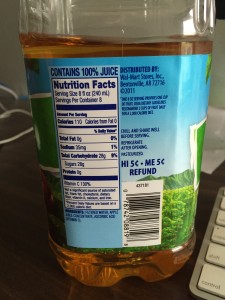Americans are always being told to eat healthier. With over 50% of adults in America considered to be obese, people are desperately trying to lose weight and be more cautious of what they’re putting into their bodies.
“I learned about GMOs in biology my freshman year, but I never really thought much about them,” junior Rory Hammond said. “They’ve always been around my life, so what’s the big deal?”
GMO (Genetically Modified Organism) is “any organism whose genetic material has been altered using genetic engineering techniques”. In 1996, GMOs was introduced, which increased health problems in many people. GMOs leave behind material inside the human body which causes “long-term problems”, such as affecting DNA and releasing toxic insecticides. For example, pregnant women are at risk when consuming foods with high GMOs. It is very dangerous for genes and GMOs to mix, for it can cause the unborn fetus to develop nutritional deficiency and food allergies.
“I’ve never actually thought about GMOs,” junior Jonathan Dunn said. “I’ve only ever looked at the ingredients or calories. GMOs have never come to mind, but it seems like a really huge situation.”
GMOs not only harm the human body, they also harm the environment. Genetically modified crops pollute water resources, reduce biodiversity, and are all around unsustainable. GM crops are eliminating habitat for monarch butterflies and damaging ecosystems, along with causing organ damage in animals who are consuming and surrounded by the toxic GM crops. The IAASTD (International Assessment of Agricultural Knowledge, Science and Technology for Development) have stated that current GMOs do not actually fight for poverty and reducing hunger.

“Being around people who are vegetarians/vegans have really opened my eyes to what GMOs are,” sophomore Irene Hankins said. “Ever since I found out the information about how it is tested on animals and what the chemicals do to us, I’ve tried to eat organic.”
Many scientists that have come out proving that GMO products have problems and aren’t actually healthy has been “attacked, gagged, fired, threatened, and denied funding” for trying to spread information to the general public about what GMOs seem to be doing to organisms. The U.S. government has received numerous health advisements against GMO, yet allow producers and companies to sell their products without having to label the containment of GMO, stating that they “had no information showing that GM foods were substantially different”.
“I guess people just don’t know what to do when it comes to GMOs,” sophomore Brandon Garcia said, “There’s such a fine line between good and wrong that everyone seems to be on the fence about a lot of stuff that goes on in life… honestly, if everyone would just stick to facts, life would be easier.”







